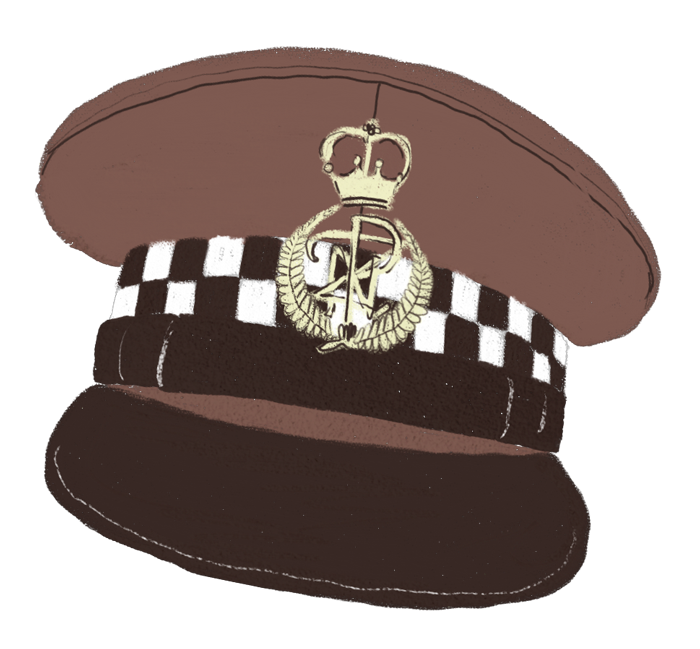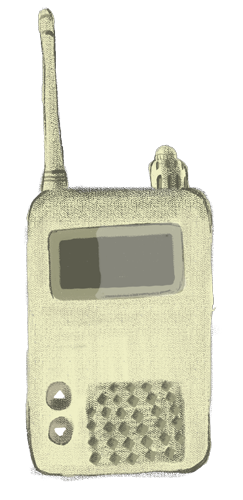



Within 12 months, police made 9435 searches without a warrant to do so - nearly twice as many as recorded in the year before. Māori and Pasifika people were many times more likely to be the subject of these searches. And the searches were less likely to lead to charges than in previous years. A months-long Stuff investigation lifts the lid on what the Police Commissioner admits are “appalling” figures.
Of all the tools available to the police, there are some we see all the time, and then those that seem to go under the radar.
The police helicopter, Eagle, with its whirring blades in the Auckland skies is hard to miss. Tasers, dogs, batons and handcuffs - they’re things we’re all familiar with.
But there’s one that many people will hardly know about, if they’re lucky. It’s like a superpower for police officers who believe they’ve detected crime; Superman has the ability to leap tall buildings in a single bound - police have the ability to leap right over the Bill of Rights.
It’s a power police say they wield responsibly and within the law.
But it’s a tool which leaves a gnawing knot in the stomach of those who worry about how justice is meted out in Aotearoa. And it’s leaving people feeling dehumanised and angry.
“It's building distrust, it's targeting people who are vulnerable, it's breaching their rights by treating them differently,” says former prosecutor turned defence lawyer Kingi Snelgar.
So, what is it? It’s the power of the police to stop and search someone without a warrant. This is something police do dozens of times every day, but depending on where you live, or your ethnicity, you may never see it happening.
A Stuff investigation into the powers of the police to stop and search people has uncovered:

The outcome, say many lawyers and justice advocates, is evidence of an attack on human rights.
“The Bill of Rights has been totally degraded,” says Green MP Golriz Ghahraman, a former human rights lawyer who took a landmark case involving race and the use of warrantless searches.
“It’s become a culture of police going on fishing expeditions to see if they can find something. I hate it.”


Others, too, are adamant something has to change.
John Tamihere, chief executive of social services provider Te Whānau o Waipareira Trust, accuses the police of going on “fishing expeditions on brown people”.
“The culture of the police needs to change from believing that every brown person is a suspect and every brown person is a possible perpetrator of a crime.”
Police Commissioner Andrew Coster admits the raw data is “appalling”. But he says it’s a complex area where police need to understand the “drivers” of what is causing the disparity.
“We need to be confident that we are operating fairly and appropriately to all groups of people in the parts of the process that we control. And that’s where we’re digging into to understand at the moment.”

Even if you’ve never had any personal experience with the police, and all you know about them is through cop drama shows on TV, you’ll know the phrase: “Open up, it’s the police - we’ve got a warrant!”
A warrant is an official document which gives the police authority to search for evidence of a crime. In New Zealand, they can be issued by a judge, justice of the peace, community magistrate or court registrar when convinced the police have reasonable grounds to believe an offence has been (or is being) committed. It’s a formal process, with oversight.
But there is a whole other category of searches where there is often no immediate independent oversight - warrantless searches, the power of a police officer to enter a property or stop someone and search them on the spot under certain circumstances.
The reported use of warrantless searches is climbing. Between 2018 and 2019, they almost doubled, from 4942 to 9435 - a 90 per cent increase.


Police say the leap in reported searches since March last year is because of the introduction of a new system for recording them, via their iPhones. The change, says the Police’s manager of strategy and capability, Kathryn Wilson, means there is a more accurate picture of the use of the powers, including when multiple searches are carried out during the same incident.
Wilson does not believe it “represents significant change in the actual use of warrantless search powers by our people”.
The commissioner agrees: “I think it suggests we must have had an incomplete picture before.” But overall, Coster is not concerned with the number of searches being carried out.
We have hundreds of thousands of interactions out there every year. The key question is: what’s the driver behind the search, is it lawful, and is it appropriate?
The law which empowers police to act is the Search and Surveillance Act. The main situations covered include when police believe there are drugs or firearms offences, where officers need to carry out an arrest, or to preserve evidence that might be destroyed.
The data shows there has been an increase across the board.
In 2018 and 2019, drug searches were the biggest reason cited for a warrantless search, followed by firearms.

Digging out information about warrantless searches has been a drawn-out process. Two years ago, Stuff asked for a breakdown of warrantless searches by which section of the act was used, and by ethnicity.
A reply came back, with a stack of numbers, and this comment from Detective Inspector Craig Scott: “Please note that Police do not hold data on ethnicity in the context of your request.”
We asked for more information about those numbers. The reply: Police, apparently, could not give a geographical breakdown of the numbers initially provided, but they could with a whole new set of data.
It seemed to be hard to analyse what was happening in much detail.
So, instead, we asked for details of every warrantless search carried out in 2018 and 2019, including where those searches happened, to see if there was a way of matching it with population data.
Police would not release exact locations of each search, citing privacy reasons, nor which searches resulted in an arrest, saying that information did not exist.
But they did send other details of every search in those two years, including the district, area, and station of the officer who carried out the search.
Analysis of those 14,000 searches over those two years shows where they were carried out, based on police station locations.



On the raw numbers alone, Christchurch stood out, particularly after the mosque terror attacks of March last year, when police activity stepped up. Stuff reported this year that in Operation Whakahaumanu there were 600 people of interest in Canterbury alone, with hundreds of properties searched in the district as part of the operation. Three searches, including at least one in Canterbury, were ruled unlawful by the Independent Police Conduct Authority.
Other stations which were associated with hundreds of searches were Wellington, Hastings, Whangārei, Timaru, and Hamilton Central. Four of the top 10 were in Auckland: Henderson, Manurewa, Ōtāhuhu and Mt Wellington.
Aside from the increase in the overall number of searches between those two years (90.9 per cent), the other big change was a dramatic rise in searches where police had not even recorded which station the officer came from.
In 2018, about 7 per cent of the searches listed “unknown” for station, district and area. By 2019, that was 24 per cent - it was unclear where more than 2200 warrantless searches had even happened.
Unknown station searches in 2019 can, alone, explain half of the increase between years.
Asked why this would be the case, police said formal notifications are recorded only in relation to the officer who carried out the search, and that the information is subject to change “due to internal movements in our workforce”.
As to why “unknown” would have increased so much, Wilson said: “There is no known reason that such errors would have increased.”
A blurry picture was emerging, with lots of missing and confusing information, making it hard to tell who the powers were being used against and whether certain communities were being targeted.
John Tamihere describes the gaps in the data as a “big hole that needs to be closed”.
“You've got to count the numbers: the numbers of kids you've turned over, numbers of cars you've turned over, what time you turn them over, and where you turn them over. And all that information has got to be logged.
If you've got an outstanding power to regulate the rights of another Kiwi, that should be applied with transparency and accountability.
Roimata Smail, a lawyer who has taken claims to the Waitangi Tribunal about the Crown’s treatment of Māori, cannot understand how there can be so many holes in the data, especially about ethnicity.
“It's not just relevant for Māori, but for all New Zealanders because we believe that our systems work properly, but if the information isn't collected, there's no way for anyone to check that.”
It is, however, particularly important to be able to examine whether there is a disparity in the way Māori and Pākehā are treated, Smail says.
“There's growing awareness that actually something's off there,” she says. “If they're keeping that information a secret by not recording it, that's sort of something that is damaging to all of us because they're doing those things on our behalf, but they're hiding what they're doing from us.
“And we're believing that they're going off and doing things right and there's not undue focus on one group. But if they're hiding that information, we don't know - they might be doing things really, really badly that we would really disagree with.
“I think most New Zealanders wouldn't want to find out warrantless searches are being done on a particular group without good reason.”
Stuff’s search for data went on - and eventually, made a surprising discovery. But in the meantime, it was time to speak to some people about their experiences with police.
He’s just 16 but when asked if he’s been searched before, this Henderson school-leaver immediately responds: “Too many times.”
The last time was just last week, though, he says, he could see why that time: he was a passenger in a stolen car. So he admits he’s no angel, and he can see that the police have a job to do.
But there’s one time, when he was just 15, that still really gets him.
It was before Christmas last year, he and a friend, who was 17, had caught the train to Mt Albert to go visit a friend. They were just leaving the station when a police car pulled up in front of them, and three officers got out.
“They said, ‘What are you boys up to’? We said, ‘Nothing’.”
And they weren’t, he says. They were on their way to visit a friend.
The officers told him there had been some crime in the area and they wanted to talk to them. But they didn’t just talk to them, he says. There was a search.
“They went through my pockets, inside my pants, lifted up my shirt, and then they made me take off my shoes.
“We kept arguing, ‘We haven’t done anything’.”
In the end, after about half an hour, the police let them carry on, and the boys walked off to their friend’s house, he says. But they were angry and frustrated.
Look, says the 16-year-old, he gets it, sometimes: in his neighbourhood, he’s known as a troublemaker. But this was different.
“It was a s... thing to do because they didn’t know us, they just came up to us because we were brown boys.”
Why should he be searched?
The teenager is not alone in feeling targeted by police.
One morning last September, Raki (who asked that only his surname be used) had just finished a regular morning loop through Cornwall Park, part of a commitment he has made to keep up his fitness in middle age.
After the walk, he returned to the car, his sister’s 1995 Honda Civic, an old car, sure, but with an up-to-date warrant and registration.
“I took off my shoes, put my jandals on, and was just having a bit of a rest and a bottle of water,” says Raki.
He noticed a car slow down as it passed by him. “I was like, ‘Oh, it’s the cops. OK’.”
The police car turned around and pulled up behind Raki’s. In his rearview mirror, Raki could see the officer looking in his direction and using the radio.
“I wasn’t concerned, so I just sat there, and then I was ready to go so I started driving down the hill.”
Then he noticed the police car approaching rapidly.
“I saw him zooming up behind me with his lights flashing and sirens, and I was like: ‘Oh, what’s going on here?’ I actually thought he was trying to go around me.”
The officer wasn’t trying to go around Raki. The officer wanted Raki to stop.
So he did, pulling into a carpark by a children’s playground.
“He actually parked right behind me, making sure I couldn’t get out.”
Raki had no idea why he would have been stopped. So, when the officer came to his window, he asked.
“I don’t understand - have I done something wrong? Because I can't see any reason for you stopping me.
“And then he looks at me and he goes, ‘Oh, mate, there's been a few break-ins of cars up around there’.”
Raki was shocked. He could only think of one reason the police would have singled him out from all the people in the park at that time: his brown skin.
He said to the officer: “So you're saying that because I'm an Islander driving an old car - what do you think? I'm going to steal cars, break into cars?”
“I was really upset because I couldn't understand why he stopped me. But then I thought about it and I knew he pretty much stereo-typed me.”
Raki’s feelings are an echo of what Māori and Pasifika have complained about for decades.
Lawyer Kingi Snelgar, who works in Manukau, says many of his clients have weekly interactions with police.
“It's not an uncommon occurrence they're stopped for things like warrant and registration checks,” says Snelgar. “You don't really get those kinds of assumptions for Pākehā people, not in the same way. Pākehā don't get stopped and asked about being suspicious.”
Do the police stop and search Māori and Pasifika disproportionately? It’s apparently not something that’s easily checked: remember, we’d been told in that 2018 Official Information Act response the data does not exist.
It seemed odd. You can find ethnicity data for all sorts of other interactions in the criminal justice system - from imprisonment rates, to who gets diversion - so why not for warrantless searches?
John Tamihere thinks he knows why.
“They know what they're doing and they know they are targeting Māori and Pacific Island communities a lot greater.”
Roimata Smail has encountered the problem of a lack of data before in her Waitangi Tribunal claims.
“Across all of our cases where we're looking at differential treatment of Māori and non-Māori, there always seems to be information that you would have thought that government departments should be holding and it's just not there,” she says. “I don't know about motive but there's certainly a pattern.”
Snelgar believes there should be publicly-available data to track how police are using their powers - powers which he points out are discretionary: it comes down to officers in the heat of the moment making a decision about whether to search.
“And I think there is a huge difference across the police force about the way those powers are executed.
“You have some really good police officers, and some that just seem to be exercising their discretion to the fullest extent against Māori.”

With the dataset from police of all 2018-2019 searches, Stuff was able to look at where searches were being used in relation to Census data about ethnicity.
To get a measure of where there might be disparities, we introduced crime data too. Was there any correlation between reported crime and warrantless searches?
Our analysis showed some stations serving communities with a higher share of Māori and Pasifika residents were more likely to see higher numbers of warrantless searches when compared with stations of similar crime rates.
This was particularly the case when examining drug crime and drug-related searches (sections 19 and 20).
Henderson, an area of Auckland that represents the largest estimated community served by a single police station, was an outlier.
A vastly disproportionate number of warrantless searches have been carried out there, despite the area being proportionally one of the 10 safest in New Zealand.
Henderson is home to a considerable contingent of minorities.
Snelgar says data like that backs up his belief some communities, particularly those with higher Māori and Pasifika populations, are being targeted unfairly.
“You don't really see police officers roaming Parnell or Herne Bay stopping young people and saying: ‘What are you up to today?’ Whereas, in Manukau that happens.”
If police are patrolling some areas and not others, they’re bound to find more wrong-doing.
“In areas like Parnell or St Heliers, if you have a young person the same age as my clients, I would suspect that they probably not even once a year might see a police officer in their community, let alone have an interaction with them. And I think people forget that there is over-policing in our communities like Manukau and Manurewa.”

John Tamihere
John Tamihere
John Tamihere agrees: “We have targeted police operations in poor areas. If you over-regulate, over-police, you will find fault.”
Out west, he says, people see it all the time.
“And we see that cars of brown boys get picked up and white boys seem to drive past. You have to ask the question: why did you pick up the brown boys without any due cause and you went on a fishing expedition and then the white boys were allowed to drive past? What made you believe that they're better than these boys?”
He says he’s not arguing all Māori and Pasifika young people are “angels”.
Do we have to watch the conduct of our young people? Of course we do. But something has to be done here because the escalation of the tension is what the problem is. And it's not all one way. It's not all the naughty, bad brown kids.
In Auckland’s west, further west even than the unofficial westie capital of Henderson, is the suburb of Rānui.
A strip of main shops is surrounded by houses squeezed beneath the Waitākere Ranges. In the middle of the township is a train station and a local primary school. More than 80 per cent of the students identify as Māori or Pasifika.
Sit down with youths from the suburb and they’re almost perplexed why you would bother talking to them about being stopped by the police: for them and their whānau, it’s not an uncommon occurrence. So why the fuss?
One, an 18-year-old tells us he’s been stopped about six times, often just while out walking with friends. The day before we spoke he was pulled over after doing a u-turn on his way to a course in the morning.
The police car had been following him for a while, when he realised he’d missed a turn and had to go back to get to a short-cut he knew.
“They turned the lights on, and I thought: ‘Oh, s...’ They thought I was up to something sketchy.”
The 10-minute conversation with the officer went nowhere in the end, but it did hold him up, making him late for his course. And it added to his perceptions of why he gets stopped by police.
“Probably the way I dress, or the way I walk or something - or my colour.”
A 15-year-old from Rānui, too, tells us he’s been stopped about “six or seven times”.
Once, when he lived on the North Shore, he was sitting in a bus stop after school when police pulled up and spent 40 minutes asking him about a stolen car. He says he had no idea about the stolen car and doesn’t know why the police would quiz him.
Again, the exchange went nowhere, he says.
But it left him feeling, once more, that he was being judged unfairly. “It just pissed me off, annoys me, makes me mad.”


The feeling of being targeted just because of the colour of a person’s skin, and assumptions being made, was tested in the Court of Appeal in 2016.
The case traced back to late one Saturday night, in central Auckland, when a police officer called out to a man walking back to a car parked down a side alley.
Eventually, a warrantless search of the car ensued after police allegedly spotted a craft knife, and 1.5 grams of cocaine was found.
The lawyers taking the case, Maria Pecotic and Golriz Ghahraman, argued that the only reason the police initially paid any attention to the man and his associate in the car was that he was brown. The officer approached the man whom he described as a “large Polynesian male”, not because there was a legitimate investigative or law enforcement basis, Pecotic argued.
Pecotic says cases like this are hard to win. But in this one “there was just this really uncomfortable feeling” that a “brown boy” going to his car was what started the whole thing off. And that wasn’t right.
“It was just really, really interesting how the police attention was drawn to this young fella in the first place,” says Pecotic.
In court, police denied that race was the trigger for the search.
The case was sent back to the District Court, for the hearing of more evidence around the initial contact, and the search itself, and eventually the case was dropped.
But the appeal court’s decision, written by Justice Sir Joe Williams, is recognised for the way in which it confronted institutional racism and its part in decision-making.
“[R]acial bias can be hard to spot,” Williams wrote. “It is frequently hidden in unspoken and even unconscious individual attitudes. Such attitudes can lead to unstated collective assumptions that inveigle their way into strategic decisions and organisational culture”.


Nelson lawyer Steven Zindel, a spokesman for the Criminal Bar Association, points out that human rights law prevents racial profiling. But that doesn’t mean it doesn’t happen. It’s just how things are worded.
When questioned about why they chose to stop someone, no officer will directly identify race.
“Policemen will swear in the witness box: ‘I didn’t stop him because he was Māori. It was just because I was concerned about his erratic behaviour’. Who notices erratic behaviour? A middle-class person looking a bit erratic might not be stopped.”

Former Crown prosecutor Kingi Snelgar
Former Crown prosecutor Kingi Snelgar
Snelgar, a former Crown prosecutor, has taken cases trying to have evidence gathered through warrantless searches thrown out, examining the reason for the initial interaction between his client and police.
“We're trying to pull the layers back,” he says. “Like often you'll hear police say the reason was there was some suspicious behavior. But when you pull the layers back about what is it that was suspicious, for me anyway, there is this underlying current of race being a ground for warrantless searches.”
Other words that get used are “shifty” or “jumpy”, he says. “But when you focus on what are the characteristics of the person besides that, it's often that they are young brown people.”
Every time he’s challenged a search, police have strongly opposed. But Snelgar remains convinced that, as an institution, the police culture is biased against Māori and Pasifika.
“I think that unconsciously there's still an assessment made by the police that young brown people are more likely to be committing crimes and of course that's a prohibited ground under the Human Rights Act.”


Andrew Coster
Andrew Coster
After months of reporting and analysis of the data obtained from Police under the Official Information Act, Stuff got the opportunity to interview the commissioner. Coster, who took over the job in April during the coronavirus lockdown, had had a busy day: a police dog had been shot in Northland, with officers shooting the alleged offender; and staff at headquarters were working through the Royal Commission’s report into the mosque terror attack.
Policing is never easy.
Nevertheless, Coster says he appreciates the scrutiny of this Stuff investigation, though “hopefully coverage can reflect the complexity of the issue because there’s a lot of positional stuff that’s very simple, on both sides actually, but the truth is in the middle and needs to be understood”.
He defends his staff, as you’d expect: “Our people turn up to do a good job and they don’t turn up to deliberately disadvantage particular groups of people.”
But - and there is a big but - he acknowledges there is a problem: the system.
“We need to acknowledge that practice evolves over time and it doesn’t always evolve appropriately over time. And we need to be really open to challenge that our policing practices are appropriate,” Coster says.
“I guess at some level you have to accept the proposition that the system is getting very poor outcomes for some people, particularly Māori, and therefore the system is not operating appropriately. [So] what needs to shift?”
We talk about Henderson and Manurewa, areas that stand out, places where people in the community feel they are the victims of “fishing expeditions”.
Coster says he “acknowledges those feelings”.
But he says that both of those areas are high crime areas, with weapons particularly an issue. “That doesn’t mean we’re out of the woods: it just means that when we’re analysing this stuff you have to really look at the local context.”
To the issue of areas being targeted - Snelgar’s point that you don’t see the same policing effort in Parnell or St Heliers as you do in Manukau, for instance - Coster says, look, yes, there is a risk of confirmation bias, and it’s an issue police around the world are aware of.
“But we need to be reminded that we don’t generate all the searches by proactive policing activity. There’s also a decent chunk of them which are connected with calls to service where police are called to a location because an assault has occurred or someone has been observed dealing drugs or whatever.”
It’s what he means when he talks about the “drivers” of searches. “Unpicking” what was behind a search, and then taking into account the possibility of crime in other areas not being detected because police aren’t looking in that direction means “it’s not a straight-forward situation to address”.

During the interview, Coster discloses something unexpected. It’s a complete turn-around from what we had previously been told.
Since March 2019, he says, police have in fact been able to analyse ethnicity data. Data analysts have discovered that the change in the reporting system means police are now able to cross-reference search data with other databases.
“We do have nine months of data we can share with you, from 2019.”
There are still some issues with the data, he says, and “there’s not 100 per cent reliability, but it will give you a broad outline anyway”.
When it lands, it sure does - the disparities are stark and immediately obvious.
Across the country, about 40 per cent of the warrantless searches carried out were of Māori, and 41 per cent were of Pākehā.
Those figures are significantly out of whack with population data: Māori make up just 16 per cent of the population, Pākehā about 70 per cent.
In other words, there is a 24 point difference between the proportion of searches of Māori compared to the proportion of Māori in the country.
In some parts of the country, that disparity is significantly worse. Excluding locations with very few searches, at 41 out of 284 stations - 14.5 per cent - the difference between searches and population is worse than the national 24 point difference.
More than 130 stations have a higher proportion of warrantless searches on Māori than the proportion of Māori in the community that station serves.
Stations that stand out include: Wairoa, Ōpōtiki, Flaxmere, Tūrangi, Gisborne, Whakatāne, Rotorua, Kamo, Te Puke, Lower Hutt, Havelock North, Johnsonville, Wellington Central and Auckland Central.
It’s the same for Pasifika (who make up only 8 per cent of the country’s population) in 26 stations, including Avondale, Onehunga, Glen Innes, Balmoral, Beachlands and Newmarket. For 56 stations around the country, Pasifika people are more likely to be searched than Pākehā.
There is only one station in the country (Dunedin North) where Māori have been searched at a rate lower than their proportion of that community’s population.
Lower Hutt station’s difference between population and warrantless searches share is the highest in NZ: 43 percentage points.
Dunedin North is the sole station where Māori are not over-searched.
Ōtāhuhu station Pākehā search rate is slightly above expected.
An almost exactly opposite picture applies when examining the figures from a Pākehā perspective: almost all stations carry out warrantless searches of NZ European people at a rate lower than their population in the community.
There are 40 stations around the country where Māori are five times more likely to be subject to a warrantless search than Pākehā.
If we exclude stations with less than 100 searches, there isn't a station where Māori are less likely to be searched than Pākehā.
No matter which way you cut the figures, Coster’s assessment that the raw data is “appalling” rings true.

Coster says he’s open to having a conversation about police practices, particularly as they impact Māori and Pasifika. “Generally speaking, we don’t get to control who we get called to but we get to control how we respond to the situation,” he says.
“The important thing from the police perspective is we are opening up this conversation inside the organisation. We need to be very open to the possibility that Police is contributing unhelpfully to impacts on certain communities.
“But we also need to recognise that the public expects us to respond to things happening in communities and to do that effectively and that’s where the searches do have their place.”
Officers know they need to follow the law, Coster insists.
But not everyone is as confident searches are being conducted lawfully.
Golriz Ghahraman, one of the lawyers who took the 2016 Court of Appeal case, is now a Green MP. Her fervour for human rights law remains just as strong.
“This is really important,” she says, not for the first time during our interview. It’s like she’s long been infuriated about warrantless searches and she doesn’t want to leave this conversation without making sure her point is clearly understood.
Part of the problem, she says, is that there are many interactions between the police and the public that happen in the dark, away from scrutiny. “We don’t know about … cases where Māori and Pacific people are stopped and searched unlawfully,” she says.
At a broad level, we do know that, over the past three years, while the number of reported searches is going up, the number of people charged as a result of them is going down.
Police figures show that in the 2018/2019 year, there were 10,855 occasions when warrantless search powers were exercised, and 3698 people charged as a result. In 2016/2017, that was 7203 searches and 4686 people charged.
What happened to all the people searched and not charged? Were they legitimate searches? We don’t know. Unless they lead somewhere - an arrest, for example - lawyers and the courts never hear about them.
Lawyer Maria Pecotic says she’s had clients who’ve been searched and when she’s asked the police why, she can’t get information because no charges were laid.
“The police have very broad powers and they justify a lot of things. But there also needs to be a protection of ordinary citizens’ rights.”
Tania Sawicki Mead, director of youth justice advocacy group Just Speak, is also concerned about the cases which no one ever hears about.
“There's a lot of frontline decision-making that's really murky. Are we seeing cases of people not knowing their rights being put into situations that they shouldn't be? I'm concerned about that.”
She also believes that in communities which are fearful of heavy-handed police tactics - “because we know, for instance, that Māori are much more likely to get tasered or shot, or have dogs set on them” - people are less likely to challenge improper actions, and instead just put up with harassment.
Steven Zindel says it’s not like someone is going to take a civil claim against the police for an unlawful search.
“It’s just too much to bother, so they shrug it off. But then you get the whole family will come to realise that their car is being pulled over all the time, while only certain young people will be stopped in the street and searched. And that can lead to a ‘them and us’ mentality.”
Zindel appealed one case where police had stopped a car in Nelson and found methamphetamine. Police cited Land Transport Act powers for their initial interest in the car - the legislation gives officers the right to check if a vehicle is lawfully on the road. The car didn’t have a warrant of fitness.
Once it was pulled over, police noticed a knife, which opened the door for a warrantless search to take place, leading to the discovery of the drugs.
But Zindel questioned the reason for the initial search, especially since evidence showed the car had been pulled over twice before in recent weeks. Were police using their powers to go on a fishing expedition until they found something?
The police pushed back strongly, saying the reason for stopping the vehicle was road safety, and the appeal was lost.
Zindel says his client, who had gang connections, was never going to win much sympathy. “And the public will probably say good on the police for being vigilant and being proactive. But just stopping a car because you can, saying, ‘I'm just checking your rego’, or whatever when that’s so far out of what they would normally do … they wouldn't do that for a middle-class car.”
In that case, the search was deemed lawful. But there’s a whole other category of cases which alarm Zindel and others.
They involve the use of what Zindel calls the “washing machine” of section 30 of the Evidence Act. Under that section, judges can rule evidence is admissible, even when a search is deemed to have been unlawful, unfair, or just wrong.
It calls on judges to weigh up the seriousness of the case, but Zindel thinks there needs to be debate about what constitutes “serious”. He gets that the public wouldn’t accept charges being dismissed on a technicality.
“The public doesn’t see it in terms of the greater good, they see it in terms of criminals getting off scot free.”
But he thinks the balance has swung too far.
“It would be good to have some kind of debate about when that section is used because the ends can be seen to justify the means sometimes.”
Ghahraman goes further: she’s calling for the law to be changed.
She believes the law as it stands has changed police behaviour, encouraging them to hunt for evidence.
“I don't necessarily blame police for taking on that mentality because the law is sending them that message.
“It's certainly brought about a number of cases where rights have been breached and have been found to be breached - and that's quite a high standard - where evidence has nonetheless gone through. So that's now the culture in our courts and in our police force.”
Coster disagrees: “I haven’t seen any evidence of officers taking a laissez faire approach saying: ‘Oh, we’ll give it a crack and if we get it in, we get it in’,” he says.
“I have not seen that attitude and if it existed I’d expect it to be dealt with very firmly by leaders. I would also say the courts are pretty savvy in the way they apply this stuff and from what I’ve seen they generally get the balance about right.”
A search of cases which have been appealed in the past three years reveals 20 in which defendants have claimed there was an unlawful or inappropriate warrantless search. In nine of those cases, the judges found the search was lawful.
But of the 11 which were found to be problematic - unlawful or unreasonable, for instance - six appeals were dismissed, with the courts ruling the evidence could be admitted anyway.
Ghahraman says the Bill of Rights, which protects people from unreasonable and unlawful search and seizure, has been undermined.
“What I would like to see is that we go back to a system where we prioritise the New Zealand Bill of Rights Act. If that right is breached, then the evidence should rightly be excluded from a case. And I think that would then result in police being much more careful.”
Ghahraman says human rights should be protected, even when the worst has happened.
“Because if we apply them in these cases, then what we're really saying is that we're only committed to the human rights framework when it's easy and convenient.”
Is there a problem with the use of warrantless searches in New Zealand, the power of the police to stop and search someone going about their business?
Those on the ground - the lawyers, the advocates, the people who are regularly pulled up - will tell you, yes, there sure is.
They feel certain communities are targeted disproportionately, pulled up for things others are not. The data uncovered in this Stuff investigation suggests they may well be right.
The police leadership, while supporting staff, acknowledge work needs to be done - and say it has. Coster avoids putting labels on the problem, even shying away from what his predecessor, Mike Bush, called “unconscious bias” within the police.
“My view of it is unconscious bias is a part of the picture, those tend to be the things that individually colour our individual judgments. But we also need to consider that organisationally.”
John Tamihere is much more blunt, and for him, change cannot come soon enough - he knows from his own experience this is a problem which has been evident for years, even before there was data to back up what he felt.
“It happened to me all the time when I was younger, too.
“It's only those that have suffered racism that understand it. Those that inflict it, and those that are part of a majority culture that continue to do it, see it in a justifiable light. And this issue of warrantless searches throws into major scope our difficulty in terms of racism.”


Looking back on that day in Cornwall Park, Raki still feels upset. In the end, for him, the encounter went nowhere, and, while the officer looked in his windows, no search was carried out, not so much as a ticket issued. But Raki was left with a feeling of injustice, like he has on other occasions.
Outside his parents’ house one night a few years ago, going to his car, he was approached by police and asked if the car was his; driving home in the early hours of the morning after helping the family prepare for a funeral he was pulled over and asked why he was out so late; and then, frequently, he says, the attention he gets returning home from work after late shifts.
“I see a police car going the other way, and then all of a sudden I watch the mirror and I go: ‘Here we go I bet he's going to do a U-turn, eh’. And then sure enough, he'll do a U-turn, come up behind me and follow me.”
Raki assumes at that point, the police are checking his number plates, making sure everything’s legitimate.
“And then I see him slow down and then he does another U-turn and they drive off again.”
Would this happen if he didn’t live in south Auckland, or if he was white-skinned? Of course, he has no way of knowing for sure. But he does know that “with us Pacific Islanders, it’s quite common”.
Raki has no convictions, respects the police, and knows they have a job to do. He just wonders why he gets looked at - like that day in the park.
“There were other people there as well in the park just sitting around, having a little rest before they drove off. But for some reason, he [the officer] came up to me.”
He has one regret: he wishes he’d got the cop’s badge number and complained. And he wishes for the day when he feels like police won’t look at him and think the worst.

Why? Because Stuff is as Kiwi as T-sauce in a tomato-shaped bottle. Part of the daily diet of millions of New Zealanders, we're wholly locally owned and it’s our mission to make Aotearoa a better place.
And we need your help.
Stuff has more journalists than any other newsroom in New Zealand - we represent the full length of the long white cloud. But the way journalism is funded is changing.
We need your support to keep fighting for justice like we did for Teina Pora, Angela Blackmoore and the victims of Erebus; to keep breaking major news, like when we were first on the scene as terror struck Christchurch; to champion the causes that matter to your communities, like we did to get NZ history taught in our schools, plastic bags banned, and Matariki in our national calendar.
If Stuff is a regular part of your day, please consider becoming a supporter. You can make a contribution from as little as $1. Be part of our story, and help us tell yours.








